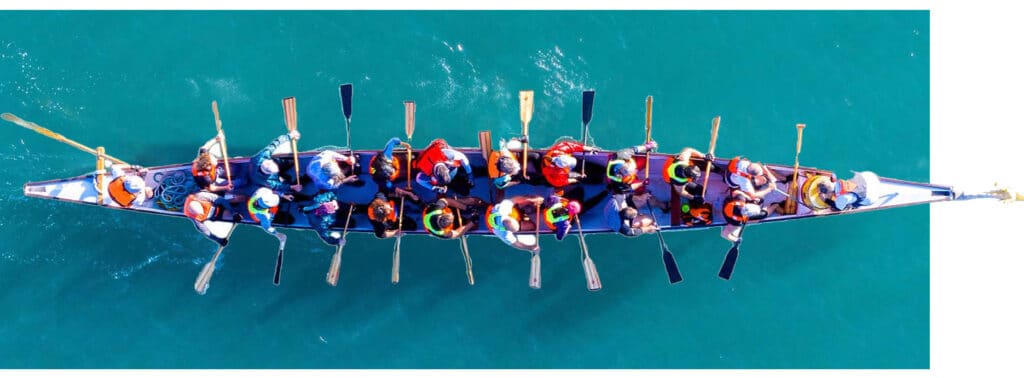From the Fergus Falls Journal by Heather Kantrud
Author Roger Jones’ 2024 novel, “The Final Victory,” was inspired by true events with his personal cancer journey
Author Roger Jones’ 2024 novel, “The Final Victory,” was inspired by true events with his personal cancer journey and experiences in staring adversity in the face, and deciding that he wasn’t going to let his diagnosis stop him.
Boldly embossed on the cover, “Shattered Bodies — Broken Dreams — The Race to Win Back Hope,” Jones’ novel, published by Companion Publishing in April, follows the story of protagonist Tripp Avery, who has been diagnosed with neuroendocrine cancer. Tripp, who represents Jones, finds himself in a place of uncertainty and feels the need for a greater purpose and human connection. Tripp’s (Jones’) diagnosis and the interpersonal response he experienced resulted in an unexpected adventure that changed his life — dragon boat racing.
Described as an adrenaline-pumping adventure, dragon boat racing consists of multiple people competing in a fiberglass, canoe-like boat, complete with an attached dragon head and tail in a race against competitors. Everyone within the boat works as a team and has a purpose. The majority are paddlers, who are required to paddle in time with a drummer, responsible for keeping a steady rhythm and beat. A helmsperson is also required to guide the boat.
Cancer and dragon boat racing may not seem like a great combination, but Tripp (Jones) wasn’t the only person drawn to the high-endurance sport. A team consisting of cancer survivors welcomed him to join them in training and competing in the Mixed Masters Dragon Boat National Championship.
Jones explained that having cancer reveals a person’s vulnerability and produces great fear, and after surgery and treatments, a cancer patient can feel ruined. “Dragon boating enhances the physical strength,” he explained. “The peacefulness of the water, the drum beating in time with our hearts and the communion among the paddlers and teammates. You begin to feel you can overcome this horrible disease.”
The diverse team of 20 boaters was composed of men and women from a wide variety of backgrounds, ages and cancer diagnoses; but despite their differences, they shared a deep determination to overcome their physical and emotional challenges. They trained hard, learning how to balance and offset individual limitations as a unit in preparation for a race that would demand endurance, strength and synchronicity.
Jones reflected on the experience, sharing that the team was always one big support group, encouraging each other to continue and press on. “We weren’t isolated and we weren’t alone,” he stated. “No pun intended — we were all in the same boat. For that period of time, you forget about cancer and you forget about being sick. There is a zen that comes over you.”
It was for his teammates that Jones wrote of their experiences together.
Jones shared: “I wrote ‘The Final Victory’ (TFV) to tell the story of the twenty courageous men and women who challenged themselves to the limits of human performance. To share the power of hope, teamwork and love. Specifically, to honor Linda (Pat in TFV), who endured Stage 4 ovarian cancer; Mark (Sean in TFV), who compared cancer to winning the lottery; Brooke, who represented numerous breast cancer survivors, to who gave courage a new definition; and Bob Carson (Thomas Huger in TFV), a Hall of Fame Citadel running back who had jaw and neck cancer, was having difficulties attending our practices as he had a feeding tube and tracheostomy as the result of multiple surgeries. I asked him if he felt he was physically able to be on the team. His response through a barely audible voice was, ‘I must be on this team as this race could be the final victory of my life.'”
The race, for many on the team, became something that represented so much more than a competition, it was an important method for coping with the trauma that accompanies a cancer diagnosis. It also provided an opportunity to recognize the importance of celebrating victories, no matter how small.
For Tripp, the fictional coach in the book, and for Jones in actuality, the team set the ultimate goal to not only to qualify at nationals, but to earn the opportunity to represent the United States at an international competition in Hong Kong, granting Thomas Huger (fiction)/Bob Carson (actual) his final victory, and setting the stage for the novel’s namesake.
Carson died on April 19, 2012, after a 12-year battle with cancer. Jones shared sentiments about his friend on his website, in a tribute titled, “The Man That Would Never Quit.” (rogerjonesauthor.com/the-man-that-would-never-quit/)
“My prayer is that these words, as they are read, will prompt the reader to praise and celebrate their victories every day,” Jones expressed. “This novel is dedicated to hope and redemption. The hope that each of us will find mercy, grace and peace. The redemption in discovering ourselves whole even if our bodies are frail and damaged.”
Reviewer opinion: “If surviving against the odds, diving into the depths of some pretty intense, grueling training and taking a long, hard look at the true meaning of teamwork is up your alley, this is definitely your book; but be prepared to shed a few hundred tears along the way. If you think one cancer story is heart-wrenching, this story has many. I really appreciated the vulnerability and honesty that seeped through the words of the text in this book. Even though it states that it is only based on actual events, I had a pretty good feeling before I heard from the author that there was more truth than fiction concealed within these pages.”
This article is reprinted by permission. See the original article (behind a paywall) at FergusFallsJournal.com

